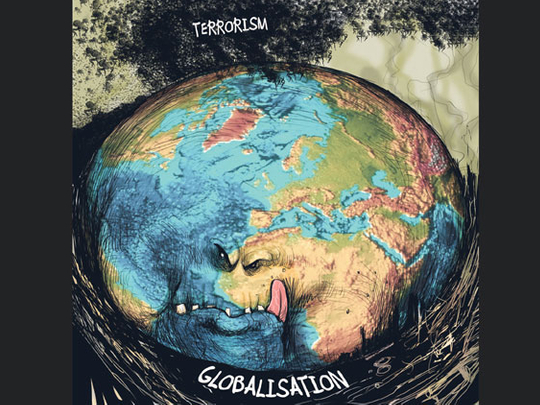
The first decade of the 21st century witnessed an unprecedented density in destructive actions, some of which were in the form of suicide bombings. Thousands of people all over the world have been killed in attacks termed ‘terrorist acts'.
Accordingly, terrorism is defined as the use of armed violence by a small group against a bigger unarmed group to achieve political goals.
The numerous studies of terrorism, the procedures implemented by almost all countries around the world to combat violence and limit its affects, and the armies equipped to fight terrorism have not succeeded in weakening it.
Terrorism still haunts leaders all around the world because of its ability to move from one place to another in obscurity.
The murkiness of terrorism's origins make fighting it difficult.
A pertinent question is: What makes a man enter the whirlpool of violence voluntarily to the extent of sacrificing himself of his free will and the lives of others against their will in order to appear as a martyr to his colleagues and a criminal and terrorist to the rest of the community?
If we study a suicide bomber's state of mind, we might enter a maze that makes it almost impossible to understand his personality, and the environment which influenced him.
Centres of discontent
Theorising in this field is difficult because historical, ideological, political and value systems intersect and complicate matters. The new world order has created many centres of discontent that threaten to erupt in several locations around the world.
Inhuman and unethical conditions create a state of despair which establishes a psychological state of mind in those who have lost all joy in life. They follow those who promise to end their frustrations.
Russian writer Fyodor Dostoevsky was the first to approach the topic of nihilist terrorism in his famous novel Devils. He talks of real life events which pushed people in despair towards destruction in an intellectual and cultural environment which was the result of events that took place in 19th century Russian society.
The incidents which accompanied the rapid development in the Russian community at the time resulted in tensions and psychological troubles known in medical circles as neurosis.
Dostoevsky inquired about the core of this disease and its role in the spread of nihilism. His research led him to another question about the dialectical relationship between the past and present.
In other words, he searched for the link between tradition and modernity and its repercussions on human thought and behaviour, especially where the present did not come in the natural development of society, but as a destruction of the past, leaving many people confused, in despair, in rejection and amidst feelings of total loss.
This is the way Dostoevsky regarded the link between the outcome of speedy changes in society and the growth of nihilistic movements. Those who cannot keep pace with this change resort to escaping life towards nothingness and announcing their insufficiency through a shattering event.
And despite the fact that Dostoevsky criticised socialist thought during the 19th century, accusing it of inhumanity, he held the ruling authorities responsible for the dispersal of nihilism amidst youth, as a result of their shortcomings and inadequacy.
It is worthy to note here that nihilists were not all of one ideological thought or religion.
Nihilism is a philosophical doctrine which suggests the negation of one or more aspects of life. Most commonly, nihilism is presented in the form of existential nihilism which argues that life is without objective meaning, purpose, or intrinsic value.
It is also an element which enhances the spirit of despair in human beings, thus making them easy targets for others to lead towards terrorism in order to fulfil their own selfish objectives.
Such a phenomenon does not occur frequently, but it does take place in special junctions of society's life when quick leaps and transformations happen.
It did ensue at the onset of the Renaissance when nations moved rapidly from agricultural to industrial societies. It is happening now as societies are swiftly moving towards the age of information technology and communication, better known as globalisation.
It is not a coincidence that terrorist acts are on the rise in the same period that we are witnessing a new world order where balances are disrupted; where differences are deep between rich and poor nations, and between the rich and poor of the same community; where the role of the middle classes has fallen behind and globalisation has become a monster crushing cultures and traditions along the way.
The emergence and spread of terrorism is rooted in subjective causes which no single country is able to address comprehensively, and at the expense of liberties such actions involve.
In simple terms, terrorism is a product of the world order, and the cure lies in searching for the deformities of this order.
Dr Mohammad Akef Jamal is an Iraqi writer based in Dubai.


_resources1_16a3106e66e_small.jpg)





